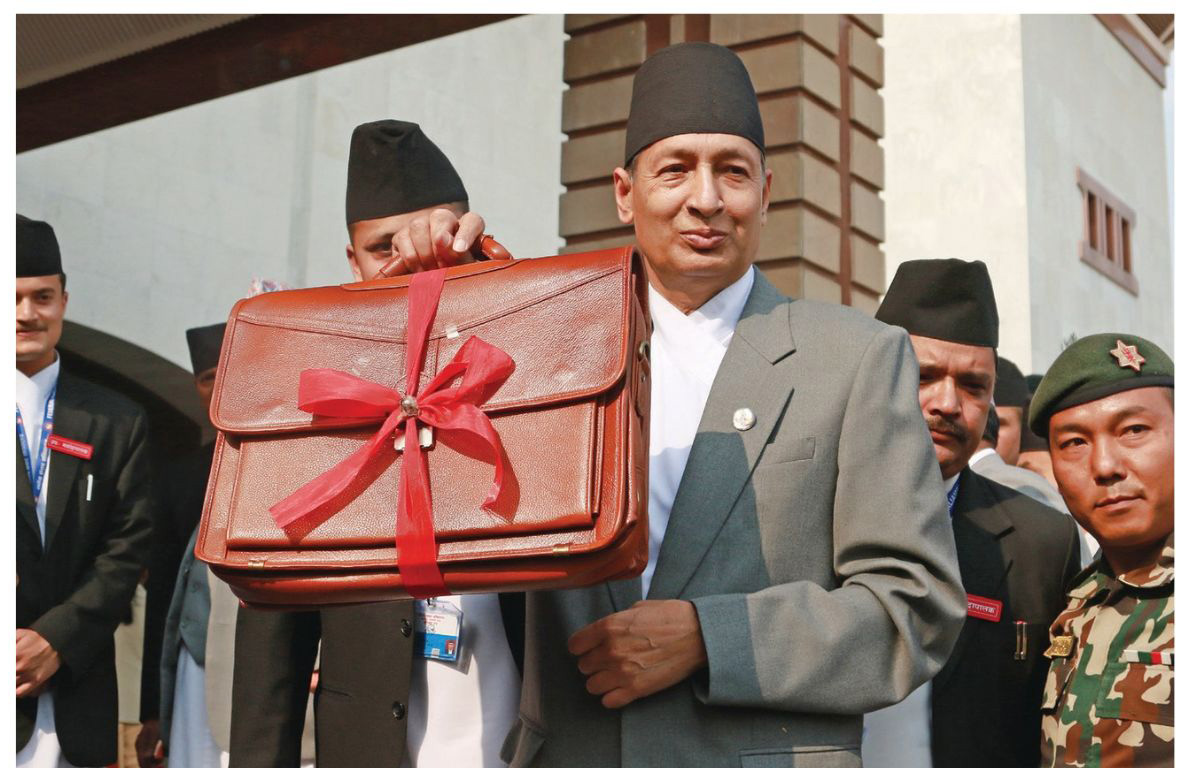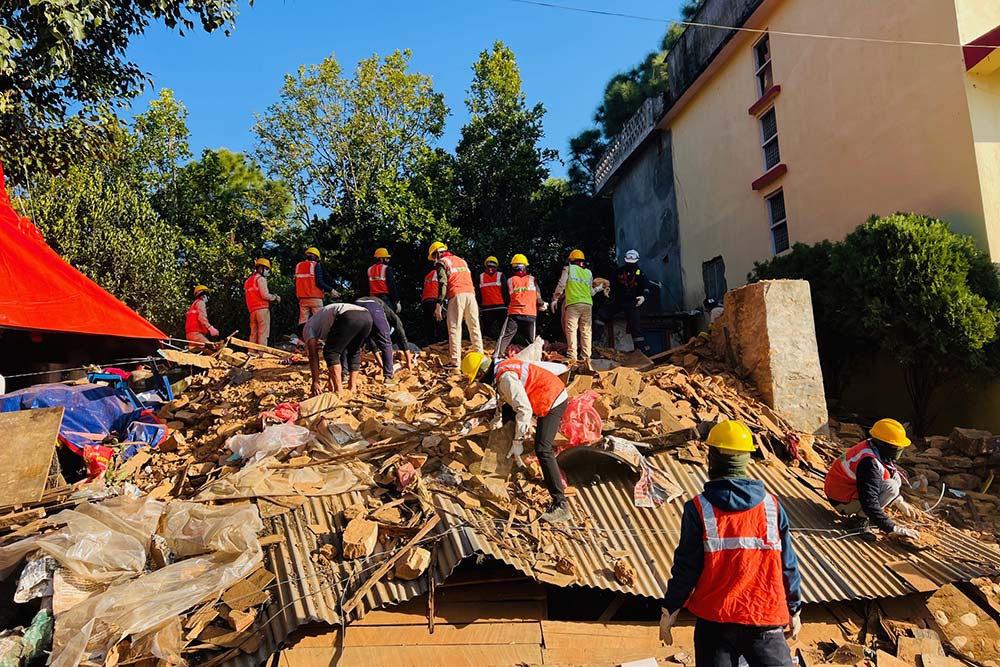
The federal government has presented its budget for the fiscal year 2018-19 at the joint session of the House of Representatives and National Assembly on May 29. The budget aims to transform the production sector and address infrastructure bottleneck towards unleashing the economic potential of the country.
The federal budget of Rs 1,315 billion for the next fiscal 2018-19 has targeted a growth rate of 8%, generate jobs for additional 500,000 individuals, and keep annual average inflation at 6.5%.
The federal budget was presented by Finance Minister Dr. Yubaraj Khatiwada, a renowned technocrat, is being seen as a realistic and balanced budget, according to the country’s major economists. "There are no populist and distributive programmes in the budget. It is a sound budget in terms of budget allocation and fiscal discipline," said Dr Shankar Sharma, renowned economist and former Vice Chairman of the National Planning Commission, adding, "The budget has set a target that must be achieved from allocated resources under each heading like agro production, road construction, electricity generation, among others."
The budget lays emphasis on boosting productivity, developing public infrastructure, generating employment, and enhancing skills of the labour force.
Grant transfer to the sub-national government
The federal budget has transferred grants to provincial and local bodies worth Rs 123.43 billion and 205.05 billion respectively under equalization, conditional, matching and special grants. The federal budget has allocated Rs 5 billion each for provinces and local bodies as matching grants and Rs 5 billion each for provinces and local bodies as special grants. Likewise, provinces and local bodies with enjoy sharing of revenue worth Rs 60.42 billion and Rs 53.82 billion respectively from divisible funds operated by the Financial Comptroller General Office. Based on these resources, the provincial governments will present their budget to the Provincial Assembly (Parliament) by mid-June and local governments will present their budget to the Budget Assembly 20 days ahead of the fiscal year calendar.
Aim to increase investment in the economy
The federal budget encourages investment in the economy taking into account how low investment is a major constraint for economic growth. Investment in agriculture, industriy, energy, and tourism are prioritised as these sectors are considered drivers of growth. Finance Minister Khatiwada has announced various loan schemes on subsidised credit for returnee migrants, unemployed youth, women and Dalit communities. This has been seen as an attempt to channelise funds from banks and financial sector (BFIs) to the production sector. As announced in the budget, project loans of up to Rs 1 million will be provided to returnee migrants based on certification of their skills. The fiscal budget has also announced loan of Rs 700,000 to youths against collateral of their academic certificates. Education loan will be provided at 5% interest to students of economically-backward and marginalised groups. The budget has a provision to provide guarantee on both aforementioned loan schemes and insure the enterprise run by the borrowers. The federal budget has announced subsidising interest rate by up to 5% on loans of up to Rs 1 million for Dalits on group guarantee to encourage them towards community-based production schemes. The budget has announced loans of up to Rs 1.5 million for women-run projects with specific skills on group guarantee by subsidising interest rate by 6%. "The schemes aim to boost production and support poverty reduction in an inclusive and gender-friendly manner," according to Finance Minister Khatiwada.
The fiscal budget has given due priority to the tourism sector and allocated Rs 5.2 billion for its development with the aim of bringing two million tourists in the next two years.
The budget has envisioned attracting foreign direct investment as supplementary capital for domestic investment in those areas that produce goods and services for exports and will have optimum value addition in the economy. The budget has offered 5% cash incentive on exports. However, the budget discourages foreign direct investment in non-tradable sectors like real estate. The federal budget envisages reform of legal, administrative and procedural aspects. It has also announced to amend the Investment Board Act to facilitate investments.
Similarly, the federal budget has announced incentives to boost agriculture production. The government will bear 75% of insurance premium on agriculture, livestock and fishery. A total of Rs 5 billion has been allocated for subsidising interest in agriculture credit for the fiscal 2018-19. Likewise, 25% grant will be provided to farmer cooperatives for purchasing equipment for processing milk, meat, fruits and vegetables and similar amount of grant will be provided for establishing factories of silk, cotton and wool. Sugarcane growers will get grants based on production. The federal budget has allocated Rs 4.77 billion for the Prime Minister Agriculture Modernisation Project that aims to develop pocket areas of agricultural products based on potential and geography.
Skills and Employment
The budget has laid emphasis on job security and enhancing skills of the labour force. It has aimed to create 500,000 jobs in the areas of commercial farming, irrigation, drinking water, flood control, forest, tourism, transport infrastructure, industry and businesses in next fiscal year. As per the announcement of the government to create sufficient job opportunities in the economy within five years, the budget 2018-19 has allocated Rs 3.1 billion for the programme titled 'Prime Minister Employment Programme'.. The budget has given due priority to skill development at the school level and allocated Rs 840 million for vocational education. The federal budget has also envisioned to end the practice of keeping bonded labour and a total of Rs 3.89 billion has been allocated for rehabilitation of bonded labour force. .
Infrastructure
The federal budget has allocated resources efficiently for development of critical infrastructures and completion of such infra projects within stipulated timeframes. Considering irrigation is a necessity for doubling agricultural production, the budget has allocated Rs 10.99 billion for major irrigation projects, namely Bheri-Babai diversion, Rani-Jamara-Kulariya, Sikta and Babai irrigation projects.
Likewise funds are allocated to develop new Butwal-Gorakhpur cross border transmission line, kick start detailed project report of Lamki-Bareli, Duhabi-Purniya and Kohalpur-Lucknow transmission lines. The budget has envisioned installing 765 kv high capacity transmission line from Galchhi of Dhading to Rasuwagadhi to Kyirong (China border) within five years. The budget has encouraged private investors to build transmission lines under build and transfer (BT) model.
To take forward energy (generation, transmission) projects and augmentation of existing system, the federal budget has allocated Rs 83.9 billion for the energy sector. The budget has allocated Rs 19.35 billion for improvement in aviation infrastructure. A total of Rs 109.38 billion has been allocated for transport infrastructure - roads, rails, tunnels, among others - and Rs 151 billion has been allocated for post-earthquake reconstruction.
Apart from regular projects, the fiscal budget has announced Madan Bhandari East-West Highway along the Chure range as a new priority project and allocated Rs 4.5 billion for it. The fiscal budget, however, has given continuity to constituency development programme (CDP) and allocated Rs 40 million to each of the 275 constituencies despite public criticism that the CDP contradicts with the federal system, in which the sub-national government looks for development work and service delivery in the lower layers of administration. The CDP has extended rights to lawmakers to select projects in their electoral constituencies which is highly criticised as the programme is believed to be against the practice of federalism and promotes the pork-barrel politics.
Social security, salaries and perks of civil servants
Unlike previous communist governments which launched social security allowances as a populist programme to woo voters, the Finance Minister has sought an alternative in fiscally prudent and disciplined manner. The federal budget has offered health insurance scheme amounting to Rs 100,000 for senior citizens above 70 years. The budget has raised life insurance of civil servants to Rs 200,000 instead of raising social security amount and salary respectively. The government will bear 50% of the insurance premium of civil servants. Instead of increasing salary of civil servants, the Finance Minister has raised the inflation allowance to Rs 2,000 per month and allowance for dress to Rs 10,000 per annum for civil servants.
Changes in tax and tax incentives
The government has introduced a new income tax slab through the budget for the next fiscal year. The existing 15% and 25% thresholds have been replaced with 10%, 20% and 30% income tax slabs effective from the new fiscal year.
The new fiscal policy has also raised excise duty by up to 40% on automobiles depending on cubic centimeter (cc) capacity of vehicles. The government had been levying 60% excise duty on vehicles so far. The budget for the next fiscal has increased excise duty on two-wheelers above 150 cc and four-wheelers above 1,000 cc. Through the budget, the government has increased excise duty on two-wheelers above 150 cc to 250 cc by 10% to 70%. Similarly, excise duty for two-wheelers above 250 cc has been increased by 20% to 80%. Excise duty on four-wheelers above 1,000 cc to 1,500 cc has been increased by 5% to 65% while excise duty on vehicles above 1,500 cc to 2,000 cc has been increased by 10% to 70%.
Excise duty on vehicles above 2,000 cc to 2,500cc has been increased by 20% to 80% while such duty on vehicles above 2,500 cc to 3,000 cc has been increased by 30% to 90%. Excise duty on vehicles above 3,000 cc has been increased by 40% to 100%.
The new budget for fiscal 2018-19 has also increased excise duty on tobacco and beverages. Besides existing taxes on tobacco products, the government has levied 25 paisa health hazard tax on every unit of cigarette, bidi and cigar. Similarly, Rs 25 per kilogram health hazard tax has been imposed on import or domestic production of chewing tobacco. Excise duty has been raised on imports and domestic production of cocoa mixed chocolates, perfume, toys and refrigerator.
The government has also increased the income tax for telecommunication service providers and internet service providers by 5% to 30%. Meanwhile, the government has scrapped the Value Added Tax (VAT) rebate facility on import of mobile phones, oil and ghee. Earlier, the government was extending 40% of VAT submitted by traders at the customs point as rebate after selling of the commodities to encourage formal trade of cell phones in the country. The budget has minimised the threshold of capital gain tax (CGT) on real estate transaction to Rs one million from Rs three million, which will be executed from the new fiscal.
Similarly, the budget for the new fiscal year offers fewer incentives. The tax imposed on health and education services has been scrapped. In addition, private hospitals are barred from collecting VAT from consumers. Community hospitals have been provided 20% income tax exemption. The government has offered 10% income tax exemption for companies having paid up capital of Rs 500 million or more if they wish to transform to public limited company and be listed in the stock market. However, companies that have paid up capital of Rs one billion must be listed in the stock market as public limited company. Similarly exemption on dividend tax is to be offered to productive and tourism industries if retained earnings are reinvested in firms. In addition, income tax exemption is to be provided to firms employing more than 100 individuals. Tea, textile and dairy factories will be exempted 50% on income tax. The budget 2018-19 offers income tax holiday of five years to micro enterprises and seven years to such enterprises operated by women.
[su_box title="HIGHLIGHTS"]
- One stadium in each of the seven provinces.
- Air ambulances for emergency rescue service for pregnant women of rural areas.
- Health insurance of Rs 100,000 for senior citizens above 70 years of age.
- Agriculture Learning Centres to be established at all local levels.
- Rs 16.58 billion allocated to forest and environment sector.
- Noise pollution, environmental pollution, rampant dust in capital to be brought under control.
- Government announces 5% export incentive.
- Upgrade petroleum storage capacity to hold fuel for three months.
- Rs 19.35 billion allocated to aviation sector. Aviation infrastructures to be accelerated.
- Allocation of Rs 24.5 billion to develop and conserve drinking water and manage water sources.
- Smart toilets with modern facilities to be built in public places.
- 3,000 MW of electricity to be generated through public investment.
- North-South transmission lines to be constructed within five years.
- Rs 40 million to be allocated to all electoral constituencies.
- Rs 83.89 billion allocated to develop energy sector.
- Budget allocation for the construction of Federal Parliament building.
- Naubise Naghdhunga tunnel project to be initiated in the upcoming fiscal.
- Rs 109 billion allocated to develop transportation infrastructures.
- Rs 2.6 billion allocated to implement Tarai-Madhes Prosperity Programme.
- Every Nepali citizen to have bank account within a year.
- Companies worth Rs 1 billion must be listed in stock market.
- Government to ease the process of business registration and scrapping.
- Government to monitor NGOs.
- Income tax slab increased to 10, 20 and 30%.
- Strict action to be taken against those not complying with the revenue related regulations.






